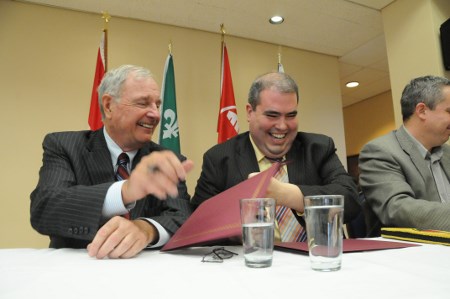Sixteen-year-old Vanessa Lewis is involved in a Laurentian University program which she said is helping her to simultaneously get in touch with her cultural heritage and prepare for her future.
Lewis, a Grade 11 St. Charles College student of Metis background, is one of seven aboriginal high school students currently taking Native Human Services (social work) courses at the university as part of a pilot project.
The courses, offered through Laurentian's dual credit program, count towards Lewis' high school diploma, as well as towards a university degree.
“I want to become a fashion designer,” she said. “The program I'm taking helps me to become a designer...I can relate (fashion design) into healing, and empowering women and boosting their self esteem.”
Lewis was one of those on hand at the university April 27 as former Prime Minister Paul Martin announced his charitable organization, the Martin Aboriginal Initiative, will be supporting Laurentian's dual credit program.
“I don't have to tell you that the youngest and fastest growing part of our population are aboriginal Canadians,” Martin said.
“The high school dropout rate (for aboriginal students) off reserve is 40 per cent. The high school dropout rate on reserve is 60 per cent. We are an aging population....It's pretty clear that we cannot afford to lose a single talent.”
Although the dual credit program is currently restricted to Native Human Services courses, a second group of students will start taking commerce classes in September, and another will start taking environmental science classes in 2011.
Dual credit programs are currently offered at colleges in Ontario, but this is the first time a university will offer dual credits.
The three-year pilot project, involving up to 60 aboriginal students from the Rainbow District School Board and Sudbury Catholic District School Board, is mostly funded by the Ontario Ministry of Education.
The Martin Aboriginal Initiative will be involved in preparing the university to provide commerce training for aboriginal high school students.
The organization will share expertise and train staff at the university on how to provide education surrounding aboriginal youth entrepreneurship.
The students taking commerce classes at Laurentian will be given entrepreneurial experience and the opportunity for business ownership.
When speaking to reporters, Martin wouldn't say exactly how much his organization would be spending to boost Laurentian's dual credit program, although he said it spends $700,000 to $800,000 a year on initiatives across the country.
The Martin Aboriginal Initiative was established by the Martin family in 2006.
One of its programs is the Martin Aboriginal Education Initiative, which includes an entrepreneurship program for aboriginal high school students, where they learn how to create a business.
“Our program is taking off, and it's working very, very well,” Martin said. “What it essentially does is it takes young people, and teaches them how business works.”
Martin congratulated Laurentian for bringing high school students into the university to learn about entrepreneurship.
“I hope that at some future time — in five or 10 years — I can make a speech in Vancouver or San Francisco, where I can talk about what happened at Laurentian University,” he said.
“This is your initiative. We're delighted to be with you, and we'll work very hard to make it succeed.”
Sheila Cote-Meek, Laurentian's associate vice-president of aboriginal programs, said the dual credit program “is really an example of Laurentian's continued commitment to providing for opportunities for aboriginal students to excel and be successful.”
“Just being on campus opens a lot of aboriginal students' eyes in terms of what happens here on campus. (They learn) that university is not, in fact, as intimidating as they might have thought.”




